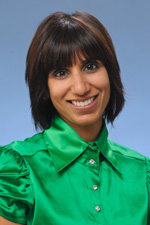Sarah Baldwin, a student in the Vancouver Fraser Medical Program, discusses her 2014 SSRP project, which examined skin cancer prevention in organ transplant recipients.
Describe FoM SSRP you were involved in?
SB: While skin cancers comprise nearly 40% of malignancies in organ transplant recipients – with nearly 70% of fair-skinned recipients affected within 20 years of transplant – there is currently no formal system for dermatologic screening of transplant patients in Canada. This results in patients who are uneducated about skin cancer prevention, who are diagnosed later in the disease progression, who have poorer prognoses, and who generate higher health costs from extra doctor visits and medications.
In this study data was collected from a new skin cancer screening clinic (SCREEN Clinic) for post-transplant patients at St. Paul’s Hospital. The SCREEN Clinic is the one of the first of its kind in BCCanada and its mandate is to address the unmet dermatologic screening needs of the post-transplant population.

“It gives me great pride to see medical students such as Sarah grow as clinicians and collaborators; to watch them present on the local, national, and then international stage, and to watch them become experts in their area of research. These early experiences often shape their future practice decisions. It is truly an honour to be involved in this process.” – Dr. Sheila Au
A 12-month retrospective chart review was conducted and comprised of SCREEN Clinic patients from both the kidney and heart transplant programs. The primary objective was to compile and analyze data from post-transplant patients with regard to demographics, overall skin cancer risk, risk factors as well as types of cancers and their incidence. The data was also analyzed to develop specific patient profiles and identify potential targets for intervention.
What, specifically, about the research topic interests you?
SB: My goal is a career in academic dermatology; this research topic was a wonderful opportunity to learn not only about clinical dermatology and transplant medicine but also about numerous aspects of clinical research including study design, implementation, data analysis and manuscript editing and production.
The prospect of improving skin cancer risk through preventive education of patients and healthcare professionals is both exciting and compelling to me. Being part of the SCREEN Clinic research team presented an opportunity to make a real difference to patients with serious health conditions that are often under-diagnosed and under-treated.
What did you learn to appreciate while participating in this project? Has this influenced your perspective on medicine and patient care?
SB: I found working at the clinic to be both an immensely rewarding and interesting experience. Not only was I fortunate enough to have an inspiring mentor who taught me a lot about dermatology and the workings of the hospital, but I also saw the impact committed and passionate professionals can have in the lives of their patients. Since starting this project, I am even more committed to the concept of preventative medicine and hope to be involved in similar projects in future.
Additionally, as part of the project I participated in an interdisciplinary conference that was funded by a grant awarded from a nation-wide competition for altruistic, patient-centered research. Participating in this conference aimed at educating health care professionals (doctors, pharmacists, nurses) about skin cancer in the post-transplant population taught me the value of interdisciplinary care – a vital aspect of modern health care.
What is the plan for your research, going forward?
SB: Since working on this project, my mentor (Dr. Sheila Au) and I have started ongoing quality assurance projects in an effort to “fine-tune” and improve the SCREEN Clinic program. These efforts include a review of biopsy accuracy to determine diagnostic accuracy, and a patient satisfaction and knowledge survey to help guide decision-making and quality of care.